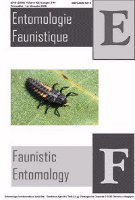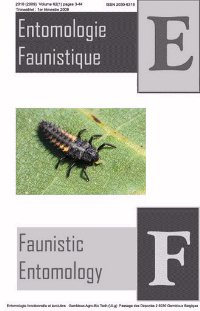- Portada
- Volume 72 (2019)
- Révision de quelques espèces d'Anoxia (s. str.) Laporte de Castelnau 1832 d'Europe et d'Asie et contributions au sous-genre. (Coleoptera: Scarabaeoidea, Melolonthidae, Melolonthinae)
Vista(s): 1035 (16 ULiège)
Descargar(s): 618 (7 ULiège)
Révision de quelques espèces d'Anoxia (s. str.) Laporte de Castelnau 1832 d'Europe et d'Asie et contributions au sous-genre. (Coleoptera: Scarabaeoidea, Melolonthidae, Melolonthinae)

Notes de la rédaction
Reçu le 8 octobre 2018, accepté le 17 décembre 2018.
Résumé
Suite à de nombreuses confusions par la plupart des entomologistes, nous démontrons que le caractère du bord postérieur du pronotum (aplati ou non) des Anoxia s. str. Laporte de Castelnau 1832 est obsolète. Nous proposons l'utilisation de la pilosité des sternites pour l'identification des espèces du "type villosa (F.)", tel que défini par J. Baraud en 1990. La femelle d'Anoxia (s. str.) makrisi Keith 2002 jusqu'ici connue uniquement par des mâles, est décrite. Anoxia asiatica ssp. montandoni Dewailly 1945 est mise en synonymie d’Anoxia (s. str.) asiatica Desbrochers 1872. Une nouvelle sous-espèce d’Anoxia (s. str.) pasiphae Reitter 1890 est décrite du sud-ouest de la Turquie. La répartition des espèces est actualisée. Anoxia (s. str.) pasiphae Reitter 1890, Anoxia (s. str.) naviauxi Baraud 1990 et Anoxia (s. str.) pilosa (F. 1792) sont signalées pour la première fois de Turquie, Anoxia (s. str.) asiatica Desbrochers 1872 est nouvelle pour la Bulgarie et la Grèce, Anoxia (s. str.) villosa villosa (F. 1781) est nouvelle pour la Grèce continentale. Une clé d'identification est donnée, ainsi que la cartographie de certaines espèces.
Abstract
Following many instances of confusion among entomologists, we demonstrate that the characterisation of Anoxia s. str. Laporte de Castelnau 1832 by the posterior margins of the pronotum (whether flattened or not) is obsolete. We propose the use of sternite pilosity for the identification of "villosa (F.)-type" species, as defined by J. Baraud in 1990. The female of Anoxia (s. str.) makrisi Keith 2002, hitherto only known by males, is described. Anoxia asiatica ssp. montandoni Dewailly 1945 is synonymised with Anoxia (s. str.) asiatica Desbrochers 1872. A new subspecies of Anoxia (s. str.) pasiphae Reitter 1890 from SW Turkey is described. The distribution of species is updated. Anoxia (s. str.) pasiphae Reitter 1890, Anoxia (s. str.) naviauxi Baraud 1990 and Anoxia (s. str.) pilosa (F. 1792) are reported for the first time in Turkey, Anoxia (s. str.) asiatica Desbrochers 1872 is new for Bulgaria and Greece, and Anoxia (s. str.) villosa villosa (F. 1781) is new for mainland Greece. An identification key is given, as well as the mapping of some species.
Zusammenfassung
Aufgrund immer wieder vorkommender Verwechslungen von Entomologen zeigen wir, dass die Beschaffenheit des hinteren Randes des (abgeflachten oder nicht abgeflachten) Pronotum der Anoxia s. str. Laporte de Castelnau 1832 bei der Bestimmung obsolet ist. Wir schlagen stattdessen vor, zur Bestimmung der von J. Baraud 1990 definierten Arten vom "villosa (F.)- Typ" die Behaarung der Sterniten zu verwenden. Das Weibchen der bislang nur in Form männlicher Exemplare bekannten Anoxia (s. str.) makrisi Keith 2002 wird beschrieben. Die Anoxia asiatica ssp. montandoni Dewailly 1945 und die Anoxia (s. str.) asiatica Desbrochers 1872 werden in Synonymie gestellt. Eine neue Unterart der Anoxia (s. str.) pasiphae Reitter 1890 aus dem Südosten der Türkei wird beschrieben. Die Artenverteilung wird aktualisiert. Die Anoxia (s. str.) pasiphae Reitter 1890, Anoxia (s. str.) naviauxi Baraud 1990 und die Anoxia (s. str.) pilosa (F. 1792) werden zum ersten Mal in der Türkei beobachtet, die Anoxia (s. str.) asiatica Desbrochers 1872 ist neu in Bulgarien und Griechenland, die Anoxia (s. str.) villosavillosa (F. 1781) neu in Kontinentalgriechenland. Ein Bestimmungsschlüssel wird vorgelegt, ebenso eine Kartierung bestimmter Arten.






